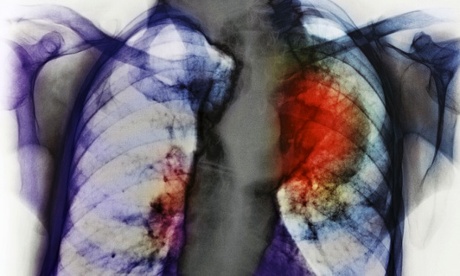You rightly report that one of the key reasons lung cancer is the biggest cause of cancer deaths in the UK is that up to 56% of lung cancers are only discovered in A&E where patients present with late-stage symptoms, by which point they often have only months to live (Report, 31 January).
Every year in the UK around 40,000 people are diagnosed with lung cancer and 35,000 people die – it kills more women, for instance, than breast, cervical and ovarian cancers combined, and is the world’s biggest cancer killer.
However, there is hope. We write as the clinical trial manager and a nurse involved in the recently completed Early Detection of Lung Cancer in Scotland trial. This trial undertaken by NHS Tayside, Glasgow and Greater Clyde and Lanarkshire in association with the University of Dundee, involved 12,209 patients and was co-funded by the Scottish Chief Scientist office, the Scottish government and UK biotech company, Oncimmune.
Early detection is the key to stop the unacceptably high death rate as early-stage lung cancer has a five-year survival rate of almost 60% – late detected lung cancer has a five-year survival rate of only 3%.
We have all been lucky enough to witness first-hand a small number of patients’ lives being saved by ground breaking new British technology. While we are hopeful, further results, analysis and research is needed before the blood test can be considered for wider use by the NHS in the at-risk population.
Pauline Armory Registered nurse, MSc, clinical trial manager
Maxine Arnott Registered nurse
• It is wrong to put the blame of late-stage lung cancer diagnosis on GPs, who overall are doing a good job of referring patients with suspected cancers, with more than 75% of patients who are found to have cancer being referred after just one or two consultations.
The symptoms of lung cancer – principally a prolonged cough – are also symptoms of more common, less serious conditions, making the decision to refer a difficult one, as it must be balanced with risks associated with overdiagnosis, and overburdening specialist services.
GPs need better access to diagnostic tests in the community and training to use them and interpret the results so that our decision to refer can be as informed as it possibly can be.
What GPs don’t need is undue criticism for a situation beyond their control when they are working under intense pressure, without the sufficient time or resources required to provide the holistic care that GPs excel at delivering.
Prof Martin Marshall
Chair of the Royal College of GPs
• Join the debate – email guardian.letters@theguardian.com
• Read more Guardian letters – click here to visit gu.com/letters
• Do you have a photo you’d like to share with Guardian readers? Click here to upload it and we’ll publish the best submissions in the letters spread of our print edition
• The first letter (by Pauline Armory and Maxine Arnott) was amended on 19 February 2020 to remove comment on trial data that had yet to be verified.








